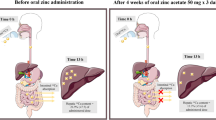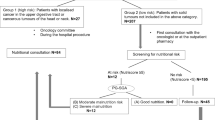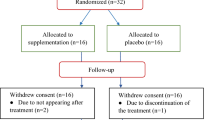Abstract
Objective: To evaluate the effect of oral administration of selenium and zinc tablets in patients with cancer of the digestive tract during chemotherapy.
Design: A case–control, randomized study.
Setting: Medical Oncology, II University of Naples, Naples, Italy.
Subjects: A total of 60 patients (median age 55 y, range 46–61 y) with diagnosis of gut cancer were randomized in 1999. Patients were treated for 60 days with chemotherapy.
Interventions: Trace elements were measured by atomic absorption spectroscopy. The nutritional status of the patients was assessed by biochemical and bio-impedance analysis (BIA) parameters in basal condition and after 60 days of treatment. Oral administration of selenium and zinc in oral tablet form for 50 days was Se 200 μg/day (50 μg/tablet) and Zn 21 mg/day (7 mg/tablet).
Results: Both in the basal condition and at 60 days all patients were malnourished. Selenium and zinc concentrations were significantly lower (P<0.01) whereas copper concentration was significantly higher (P<0.01) in cancer patients than in control subjects. However, 21/30 (70%) of those treated with Se and Zn did not showed a further worsening of nutritional status and experienced a significant decrease of asthenia with an increase of appetite. On the other hand, 24/30 (80%) untreated patients had a significant decline of all parameters studied after 60 days (prealbumin, cholesterol, transferrin, P<0.05 vs 0 time; total proteins, albumin/globulin ratio, P<0.01 vs 0 time; fat-free mass, fat mass, Na+/K+ ratio, body mass index P<0.05 vs 0 time; fat free mass/fat mass, total body water, extra cellular/intra cellular water, basal metabolic rate: P<0.01 vs 0 time).
Conclusions: Data indicate that Se and Zn supplementation may improve the clinical course of general conditions in patients with gut cancer. These effects of Se and Zn require confirmation in an independent trial of appropriate design before new public health recommendations regarding Se and Zn supplementation can be made.
European Journal of Clinical Nutrition (2001) 55, 293–297
This is a preview of subscription content, access via your institution
Access options
Subscribe to this journal
Receive 12 print issues and online access
$259.00 per year
only $21.58 per issue
Buy this article
- Purchase on Springer Link
- Instant access to full article PDF
Prices may be subject to local taxes which are calculated during checkout
Similar content being viewed by others
Author information
Authors and Affiliations
Contributions
Guarantor: A Federico.
Contributors: A Federico, P Iodice, P Federico designed the study, coordinated the field work, collected and analysed the data and wrote the paper; A Del Rio and MC Mellone performed the laboratory and statistical analyses; G Catalano and P Federico coordinated the field work.
Corresponding author
Additional information
Abstract accepted at the Congress of the International Society for Trace Elements Research in Humans (ISTERH) in 1998, Lyon, 26–30 September (poster presentation).
Rights and permissions
About this article
Cite this article
Federico, A., Iodice, P., Federico, P. et al. Effects of selenium and zinc supplementation on nutritional status in patients with cancer of digestive tract. Eur J Clin Nutr 55, 293–297 (2001). https://doi.org/10.1038/sj.ejcn.1601157
Received:
Revised:
Accepted:
Published:
Issue Date:
DOI: https://doi.org/10.1038/sj.ejcn.1601157
Keywords
This article is cited by
-
Zinc as a complementary treatment for cancer patients: a systematic review
Clinical and Experimental Medicine (2021)
-
Concentration-Dependent Effects of Zinc Sulfate on DU-145 Human Prostate Cancer Cell Line: Oxidative, Apoptotic, Inflammatory, and Morphological Analyzes
Biological Trace Element Research (2020)
-
The effects of Pueraria mirifica extract, diadzein and genistein in testosterone-induced prostate hyperplasia in male Sprague Dawley rats
Molecular Biology Reports (2019)
-
DNA binding and antitumor activities of zinc(II) complexes with some S-alkenyl derivatives of thiosalicylic acid
Transition Metal Chemistry (2019)
-
DNA binding and antitumor activities of platinum(IV) and zinc(II) complexes with some S-alkyl derivatives of thiosalicylic acid
Transition Metal Chemistry (2018)



